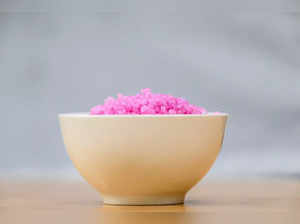 AFP
AFPNamed "meaty rice," this innovative type of rice has a slight buttery aroma, resembles regular rice but with a pink hue.
The scientists have confirmed that no animals were harmed in the process, as the rice is embedded with beef muscle and fat cell culture.
Hong from Seoul's Yonsei University stated, "Using cultured meat, we can obtain animal protein without the slaughter of livestock."
Hong, who specializes in organoids and biomedical sciences, chose rice for this research since it is already a primary source of protein for many people in Asia.
How is Meaty Rice Made?
The creation process begins with a regular rice grain coated in fish gelatin to enhance adherence. Each grain is then individually injected with beef cells and cultured in a petri dish for up to 11 days.After injection, the beef cells grow uniformly inside the rice, making the grain an ideal structure.
This "meaty" rice contains eight percent more protein and seven percent more fat than typical rice.
Hong's team is still working on scaling up the process, with hopes to have the product approved as emergency relief food in two African nations.
He said, "For those who are limited to... just one meal a day, a slight increase in (protein content), even by just a few percent, becomes incredibly important."
Ethical Questions
Currently, South Korea has not approved any cultivated meat for consumption but announced in 2022 plans to invest heavily in a "foodtech" fund and prioritize research in cell-cultured meat.Cultivated meat is available in markets like Singapore and the United States. However, Italy banned it in the previous year to safeguard its livestock sector.
Some experts raise ethical concerns about cultured meat, particularly regarding the initial sourcing of animal cells.
Former emeritus professor Choi Yoon-jae from Seoul National University highlighted safety issues in a column on Chuksan News, stating, "It is difficult to be 'certain about the safety of the serum used in culture media, and the antibiotics and hormones added during the culturing process."
According to Hong's team, their hybrid rice method leads to a significant reduction in the carbon footprint of protein production by eliminating the need for livestock farming.
For every 100 grams (3.5 ounces) of protein produced, they estimate releasing 6.27 kilograms (13.8 pounds) of carbon dioxide—eight times less than traditional beef production.
Neil Stephens, a lecturer on technology and society at the University of Birmingham, noted, "Cultured meat has long been 'presented as a climate solution compared to traditional livestock.'"
However, the cultured meat sector faces challenges such as the need for large-scale production, cost efficiency, low energy requirements, and environmentally friendly inputs.
Stephens added, "The 'meaty' rice might have an advantage over some other cultured meat products," since it is a hybrid product combining animal cells with plant material, making it potentially cheaper and less energy-intensive.
Nonetheless, Stephens acknowledged that proving the environmental benefits at scale and convincing people to eat it could be challenging.
Global consultancy firm AT Kearney predicted that by around 2040, only 40 percent of global meat consumption would come from conventional sources, potentially revolutionizing the industry.
In a 2019 report, AT Kearney mentioned, "Products such as milk, egg white, gelatin and fish can be created with similar technology."
Hong firmly believes in the transformative potential of biotechnology in altering human food consumption for the better.
For example, he suggested that lab-grown meat produced exclusively with muscle cells could aid an older person with sarcopenia, a condition involving muscle loss.
He envisions a future where increased biological information will allow meticulous control over our diet.
Hong proposed that a future AI-powered kitchen could analyze a person's health through a blood test and instruct a robot to prepare the most suitable meal.
With AFP Inputs
(Catch all the Business News, Breaking News, Budget 2024 Events and Latest News Updates on The Economic Times.)
Subscribe to The Economic Times Prime and read the ET ePaper online.
(Catch all the Business News, Breaking News, Budget 2024 Events and Latest News Updates on The Economic Times.)
Subscribe to The Economic Times Prime and read the ET ePaper online.









 Get Unlimited Access to The Economic Times
Get Unlimited Access to The Economic Times
